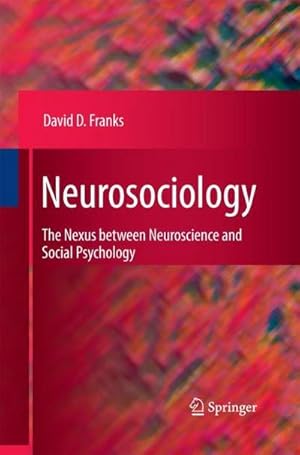9781489982728 - Neurosociology: The Nexus Between Neuroscience and Social Psychology von Franks, David D. (1 Ergebnisse)
Produktart
- Alle Produktarten
- Bücher (1)
- Magazine & Zeitschriften
- Comics
- Noten
- Kunst, Grafik & Poster
- Fotografien
- Karten
-
Manuskripte &
Papierantiquitäten
Zustand
- Alle
- Neu
- Antiquarisch/Gebraucht
Einband
- alle Einbände
- Hardcover
- Softcover
Weitere Eigenschaften
- Erstausgabe
- Signiert
- Schutzumschlag
- Angebotsfoto
Land des Verkäufers
Verkäuferbewertung
-
Neurosociology : The Nexus Between Neuroscience and Social Psychology
Verlag: Springer New York, 2014
ISBN 10: 1489982728ISBN 13: 9781489982728
Anbieter: AHA-BUCH GmbH, Einbeck, Deutschland
Buch
Taschenbuch. Zustand: Neu. Druck auf Anfrage Neuware - Printed after ordering - As a career sociologist I rst became interested in neurosociology around 1987 when a graduate student lent me Michael Gazzaniga's The Social Brain. Ifthe biological human brain was really social, I thought sociologists and their students should be the rst, not the last, to know. As I read on I found little of the clumsy reductionism of the earlier biosociologists whom I had learned to see as the arch- emy of our eld. Clearly, reductionism does exist among many neuroscientists. But I also found some things that were very social and quite relevant for sociology. After reading Descarte's Error by Antonio Damasio, I learned how some types of emotion were necessary for rational thought - a very radical innovation for the long-honored 'objective rationalist. ' I started inserting some things about split-brain research into my classes, mispronouncing terms like amygdala and being corrected by my s- dents. That instruction helped me realize how much we professors needed to catch up with our students. I also wrote a review of Leslie Brothers' Fridays Footprint: How Society Shapes the Human Mind. I thought if she could write so well about social processes maybe I could attempt to do something similar in connection with my eld. For several years I found her an e-mail partner with a wonderful sense of humor. She even retrieved copies of her book for the use of my graduate students when I had assigned it for a seminar.


